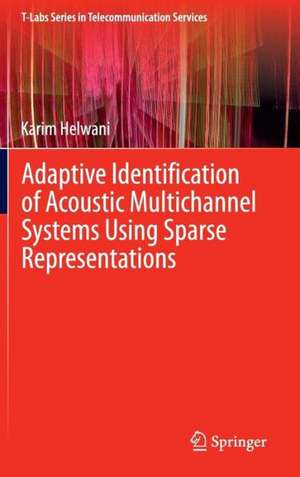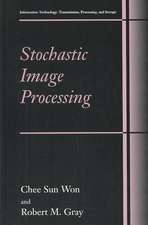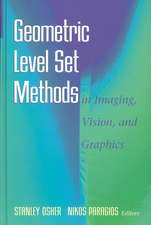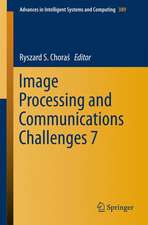Adaptive Identification of Acoustic Multichannel Systems Using Sparse Representations: T-Labs Series in Telecommunication Services
Autor Karim Helwanien Limba Engleză Hardback – 11 aug 2014
The book discusses in detail the derivation of general sparse representations of acoustic MIMO systems in signal or system dependent transform domains. Efficient adaptive filtering algorithms in the transform domains are presented and the relation between the signal- and the system-based sparse representations is emphasized. Furthermore, the book presents a novel approach to spatially preprocess the loudspeaker signals in a full-duplex communication system. The idea of the preprocessing is to prevent the echoes from being captured by the microphone array in order to support the AEC system. The preprocessing stage is given as an exemplarily application of a novel unified framework for the synthesis of sound figures. Finally, a multichannel system for the acoustic echo suppression is presented that can be used as a postprocessing stage for removing residual echoes. As first of its kind, it extracts the near-end signal from the microphone signal with a distortionless constraint and without requiring a double-talk detector.
| Toate formatele și edițiile | Preț | Express |
|---|---|---|
| Paperback (1) | 632.22 lei 6-8 săpt. | |
| Springer International Publishing – 22 sep 2016 | 632.22 lei 6-8 săpt. | |
| Hardback (1) | 638.24 lei 6-8 săpt. | |
| Springer International Publishing – 11 aug 2014 | 638.24 lei 6-8 săpt. |
Din seria T-Labs Series in Telecommunication Services
- 15%
 Preț: 640.55 lei
Preț: 640.55 lei - 15%
 Preț: 641.20 lei
Preț: 641.20 lei - 15%
 Preț: 642.83 lei
Preț: 642.83 lei - 15%
 Preț: 639.25 lei
Preț: 639.25 lei - 24%
 Preț: 633.86 lei
Preț: 633.86 lei - 15%
 Preț: 642.03 lei
Preț: 642.03 lei - 20%
 Preț: 645.31 lei
Preț: 645.31 lei - 15%
 Preț: 644.63 lei
Preț: 644.63 lei - 20%
 Preț: 579.77 lei
Preț: 579.77 lei - 15%
 Preț: 641.53 lei
Preț: 641.53 lei - 15%
 Preț: 644.82 lei
Preț: 644.82 lei - 15%
 Preț: 638.24 lei
Preț: 638.24 lei - 20%
 Preț: 702.56 lei
Preț: 702.56 lei - 18%
 Preț: 999.45 lei
Preț: 999.45 lei - 15%
 Preț: 641.03 lei
Preț: 641.03 lei - 15%
 Preț: 637.46 lei
Preț: 637.46 lei - 18%
 Preț: 719.59 lei
Preț: 719.59 lei -
 Preț: 378.54 lei
Preț: 378.54 lei - 15%
 Preț: 639.08 lei
Preț: 639.08 lei - 15%
 Preț: 637.13 lei
Preț: 637.13 lei - 15%
 Preț: 642.68 lei
Preț: 642.68 lei - 15%
 Preț: 640.06 lei
Preț: 640.06 lei - 15%
 Preț: 652.31 lei
Preț: 652.31 lei - 15%
 Preț: 642.03 lei
Preț: 642.03 lei -
 Preț: 386.61 lei
Preț: 386.61 lei - 20%
 Preț: 552.67 lei
Preț: 552.67 lei - 15%
 Preț: 645.47 lei
Preț: 645.47 lei - 15%
 Preț: 636.94 lei
Preț: 636.94 lei - 15%
 Preț: 642.18 lei
Preț: 642.18 lei - 15%
 Preț: 632.70 lei
Preț: 632.70 lei - 20%
 Preț: 648.95 lei
Preț: 648.95 lei - 18%
 Preț: 943.57 lei
Preț: 943.57 lei
Preț: 638.24 lei
Preț vechi: 750.88 lei
-15% Nou
Puncte Express: 957
Preț estimativ în valută:
122.13€ • 127.83$ • 101.65£
122.13€ • 127.83$ • 101.65£
Carte tipărită la comandă
Livrare economică 31 martie-14 aprilie
Preluare comenzi: 021 569.72.76
Specificații
ISBN-13: 9783319089539
ISBN-10: 3319089536
Pagini: 127
Ilustrații: XIV, 113 p. 39 illus., 10 illus. in color.
Dimensiuni: 155 x 235 x 15 mm
Greutate: 0.36 kg
Ediția:2015
Editura: Springer International Publishing
Colecția Springer
Seria T-Labs Series in Telecommunication Services
Locul publicării:Cham, Switzerland
ISBN-10: 3319089536
Pagini: 127
Ilustrații: XIV, 113 p. 39 illus., 10 illus. in color.
Dimensiuni: 155 x 235 x 15 mm
Greutate: 0.36 kg
Ediția:2015
Editura: Springer International Publishing
Colecția Springer
Seria T-Labs Series in Telecommunication Services
Locul publicării:Cham, Switzerland
Public țintă
ResearchCuprins
Introduction.- Fundamentals of Adaptive Filter Theory.- Spatio-Temporal Regularized Recursive Least Squares Algorithm.- Sparse Representation of Multichannel Acoustic Systems.- Unique System Identification from Projections.- Geometrical Constraints.- Acoustic Echo Suppression.- Conclusion.
Textul de pe ultima copertă
This book treats the topic of extending the adaptive filtering theory in the context of massive multichannel systems by taking into account a priori knowledge of the underlying system or signal. The starting point is exploiting the sparseness in acoustic multichannel system in order to solve the non-uniqueness problem with an efficient algorithm for adaptive filtering that does not require any modification of the loudspeaker signals.
The book discusses in detail the derivation of general sparse representations of acoustic MIMO systems in signal or system dependent transform domains. Efficient adaptive filtering algorithms in the transform domains are presented and the relation between the signal- and the system-based sparse representations is emphasized. Furthermore, the book presents a novel approach to spatially preprocess the loudspeaker signals in a full-duplex communication system. The idea of the preprocessing is to prevent the echoes from being captured by the microphone array in order to support the AEC system. The preprocessing stage is given as an exemplarily application of a novel unified framework for the synthesis of sound figures. Finally, a multichannel system for the acoustic echo suppression is presented that can be used as a postprocessing stage for removing residual echoes. As first of its kind, it extracts the near-end signal from the microphone signal with a distortionless constraint and without requiring a double-talk detector.
The book discusses in detail the derivation of general sparse representations of acoustic MIMO systems in signal or system dependent transform domains. Efficient adaptive filtering algorithms in the transform domains are presented and the relation between the signal- and the system-based sparse representations is emphasized. Furthermore, the book presents a novel approach to spatially preprocess the loudspeaker signals in a full-duplex communication system. The idea of the preprocessing is to prevent the echoes from being captured by the microphone array in order to support the AEC system. The preprocessing stage is given as an exemplarily application of a novel unified framework for the synthesis of sound figures. Finally, a multichannel system for the acoustic echo suppression is presented that can be used as a postprocessing stage for removing residual echoes. As first of its kind, it extracts the near-end signal from the microphone signal with a distortionless constraint and without requiring a double-talk detector.
Caracteristici
Offers adaptive filtering theory in the context of massive multichannel systems Shows that sparse representations can be derived based on prior knowledge about the system or the signal Includes an approach for highly correlated loudspeaker signals of multichannel reproduction systems Includes supplementary material: sn.pub/extras


















